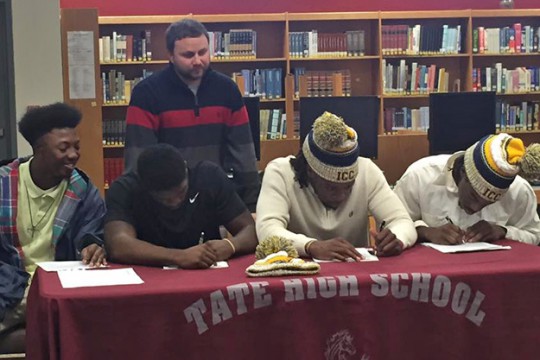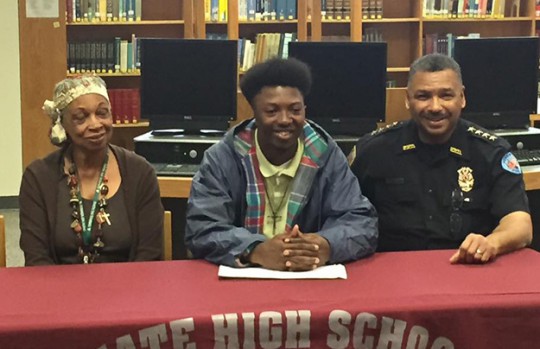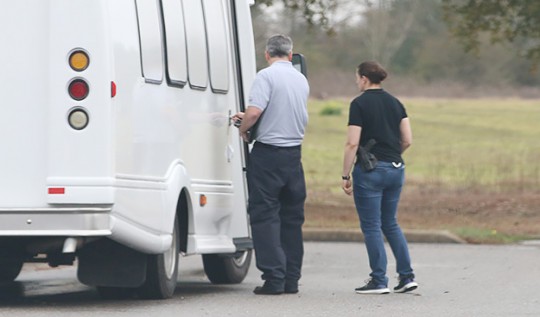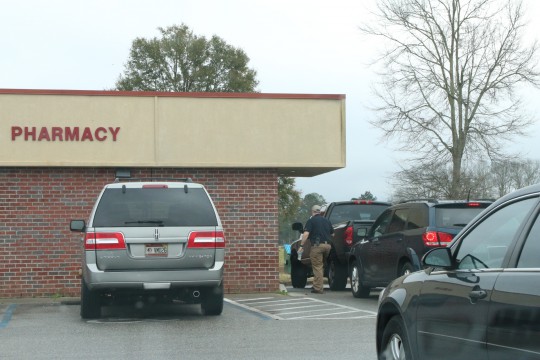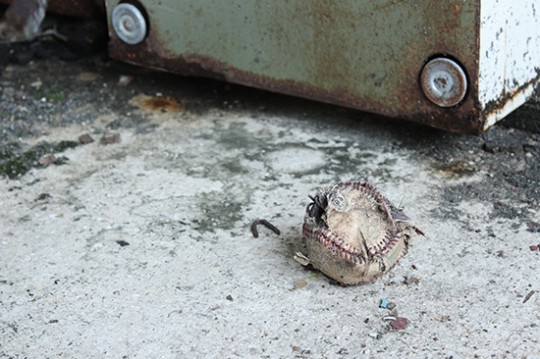Four Tate Seniors Sign With Same Kansas College
February 4, 2016
Four Tate High School seniors signed their letters of intent Wednesday for full scholarships at the same Kansas school. Monty Brown, Dee Thompson, Alonte Thompson, Alondo Thompkins all signed with Independence Community College in Independence, KS. The ICC Pirates are members of the National Junior College Athletic Association and the Kansas Jayhawk Community College Conference. Photos by Tina Decoux for NorthEscambia.com, click to enlarge.
House Backs Gun Bills, But ‘Trouble’ Is Ahead In Senate
February 4, 2016
After more than three hours of debate — with most Republicans in favor and nearly all Democrats opposed — the House approved a pair of controversial gun-related measures Wednesday that may never reach the Senate floor.
The House spent more than 80 minutes arguing the merits of a proposal (HB 4001) that would allow the more than 1.4 million Floridians with concealed-weapons licenses to pack heat while on state college and university campuses.
 The measure passed 80-37 with Tallahassee Democrat Michelle Rehwinkel Vasilinda, who co-sponsored the bill, joining all but two Republicans — Reps. Ray Pilon of Sarasota and Bill Hager of Delray Beach — in support. Two Democrats who were initially recorded as supporting the bill later changed their votes to oppose it.
The measure passed 80-37 with Tallahassee Democrat Michelle Rehwinkel Vasilinda, who co-sponsored the bill, joining all but two Republicans — Reps. Ray Pilon of Sarasota and Bill Hager of Delray Beach — in support. Two Democrats who were initially recorded as supporting the bill later changed their votes to oppose it.
Another 100 minutes was spent on a separate proposal (HB 163) that would allow people with concealed-weapons licenses to openly display their sidearms in public, something banned in Florida since the concealed-weapons law was established in 1987
“We have no constitutional basis to infringe upon the rights of a Floridian to openly carry,” said Rep Matt Gaetz, a Fort Walton Beach who sponsored the open-carry measure, which was approved 80-38. “We are for more rights for everyone. We are for more freedom for everyone. We are for more liberty for everyone.”
The proposal would require people who openly carry to maintain the guns in holsters, cases or bags. The bill would also acknowledge that private employers can display written notices stating that possession of firearms on their property is prohibited.
Rehwinkel Vasilinda again joined the GOP majority in support of the bill. Republicans Keith Perry of Gainesville and Chris Latvala of Clearwater voted against open-carry.
Opponent Ed Narain, a Tampa Democrat who recalled at age 12 having a gun put in his face while being robbed of bus money, said lawmakers shouldn’t let fear drive decision-making.
“We don’t need to resolve every dispute we have with a bullet, we’re better than that,” Narain said. “We can defend our communities without giving a gun to every Rambo or John Wayne to openly carry in public.”
An amendment added Tuesday to the open-carry bill also would let lawmakers with concealed-carry licenses hang on to their guns during legislative meetings and on the House and Senate floor. State law prohibits people from carrying guns during legislative committee meetings.
Rep. Jared Moskowitz, D-Coral Springs, said the proposal to allow lawmakers to carry guns during legislative meetings could lessen the chances of the overall open-carry bill succeeding in the Senate.
“Just a guess of mine, without talking to anyone in the Senate, this bill is already hostile to begin with over there, and now add to the fact that they can carry guns in the Senate chamber, I hoping that that turns out to be poison pill,” Moskowitz sad.
Before the House voted on the bills, Senate President Andy Gardiner reiterated his belief that both the open-carry and campus-carry measures “are in trouble.” Neither has made it through the Senate Judiciary Committee, chaired by Miami Republican Miguel Diaz de la Portilla.
“They’re in Judiciary, and I allow the chairs to make the decisions on what bills they want to hear,” Gardiner said. “Sen. Diaz de la Portilla has already decided not to hear the campus-carry bill. It was his decision. And now I think he has some concerns about open-carry.”
The Senate version of open-carry (SB 300) may be heard by the Judiciary Committee next week.
Diaz de la Portilla has said he’s open to considering amendments that could draw opposition from Second Amendment groups. That includes proposals by the Florida Sheriffs Association related to inadvertent or accidental displays of firearms. The sheriffs’ proposals wouldn’t allow open-carry and have been opposed by gun-rights groups.
The Florida Police Chiefs Association and some county sheriffs support have shown support for open-carry,
House Speaker Steve Crisafulli, R-Merritt Island, said after Wednesday’s meeting the House doesn’t advance bills based upon what the Senate may or may not do.
“Our job is to focus on the priorities of the House, and this House has shown in history to be conservative on gun issues and very supportive of Second Amendment rights,” Crisafulli said. “We feel that we passed a couple of good bills to send over to the Senate, and we’ll see what happens from there.”
Rep. Jimmie Smith, R-Inverness, said while discussing the campus-carry issue that there hasn’t been an increase in accidental discharges of guns or the “wild, wild west” scenarios that opponents have forecast, even as the number of people with concealed-weapons licenses has grown in Florida.
“This fear-mongering of allowing a mature adult to make an adult decision has to stop,” Smith said.
Rep. Jennifer Sullivan, R-Mount Dora, said allowing concealed-weapons license holders, who must be at least 21 years old, to have guns on campus would allow women to defend themselves from assaults.
But Democrats pointed to the stress of college life, which also includes widespread use of alcohol. They argued lawmakers should instead increase funding for training of campus security and for mental-health services.
“We continue to inject more and more guns into our society,” said Rep. Dwight Dudley, D-St. Petersburg. “This is a recipe for disaster.”
Rep. Darryl Rouson, a St. Petersburg Democrat who passionately implored members to not “let this bullet leave this chamber,” worried that the bills will make it tough for police to differentiate good guys from bad guys, and that shootings on campuses will become “commonplace.”
“Will we become numb to guns on campus and fights that break out and lives that are taken?” Rouson said. “That’s what I fear.”
by Jim Turner, The News Service of Florida
Jay’s Mishoe Signs With Millsaps College
February 4, 2016
Jay High School’s Victor Mishoe signed a football letter of intent Wednesday with Millsaps College in Jackson, MS – a NCAA Division III school Pictured: (L-R, seated) Evelyn Jordan, Victor Mishoe, Christy Cassady, Jack Floyd, (back, L-R) Track Coach Madison Whitfield, Athletic Director Lance Youngblood and Head Football Coach Kent Smith. Submitted photo for NorthEscambia.com, click to enlarge.
The Way we Worked: Smithsonian Institution Traveling Exhibit Coming To Molino
February 3, 2016
 “The Way we Worked”, a Smithsonian Institution traveling exhibition, is coming to the Molino Museum next month.
“The Way we Worked”, a Smithsonian Institution traveling exhibition, is coming to the Molino Museum next month.
The Way We Worked, adapted from an original exhibition developed by the National Archives and Records Administration, explores how work has become a central element in American culture. It traces the many changes that have affected the workforce and work environments over the past 150 years, including the growth of manufacturing and increasing use of technology. The exhibition draws from the Archives’ rich collections, including historical photographs, archival accounts of workers, film, audio and interactives, to tell the compelling story of how work impacts our individual lives and the historical and cultural fabric of our communities.
The exhibit will be open in the museum inside the Molino Community Complex on Highway 95A will be open Monday-Saturday from March 19 until April 30.
Plans are being made for a grand opening celebration with music, clogging, programs, additional exhibits and more. Additional details will be published on NorthEscambia.com as the grand opening date approaches.
Time To Use The Heat Again
February 3, 2016
Here is your official North Escambia area forecast:
Tonight: Mostly cloudy, with a low around 41. North wind 5 to 10 mph.
Thursday: Sunny, with a high near 56. North wind 10 to 15 mph, with gusts as high as 20 mph.
Thursday Night: Clear, with a low around 32. Northwest wind around 5 mph.
Friday: Sunny, with a high near 55. North wind 5 to 10 mph.
Friday Night: Mostly clear, with a low around 32. North wind around 5 mph becoming calm.
Saturday: Mostly sunny, with a high near 56. Northeast wind around 5 mph.
Saturday Night: Partly cloudy, with a low around 34. North wind around 5 mph.
Sunday: Sunny, with a high near 57. North wind around 5 mph.
Sunday Night: Mostly clear, with a low around 38.
Monday: Mostly sunny, with a high near 57.
Monday Night: Partly cloudy, with a low around 35.
Tuesday: Sunny, with a high near 52.
Tuesday Night: Mostly clear, with a low around 31.
Wednesday: Sunny, with a high near 49.
Health Emergency Declared: Zika Case Confirmed In Santa Rosa County
February 3, 2016
A case of the Zika has been confirmed in Santa Rosa County, bringing the total number of travel-related cases to nine that have been reported in Florida. Wednesday, Gov. Rick Scott declared a public health emergency in Santa Rosa County due to the Zika virus.
 Six of the cases are new this week. Travel-related cases are defined as disease believed to be contracted outside of the state.
Six of the cases are new this week. Travel-related cases are defined as disease believed to be contracted outside of the state.
Zika fever is a mild febrile illness caused by a mosquito-borne virus similar to those that cause dengue and West Nile virus infection. It has been identified in several countries in Central and South America, Mexico, and the Caribbean since 2015.
“Today I am directing Surgeon General Dr. John Armstrong to declare a public health emergency in the four counties that have individuals with the Zika virus. Although Florida’s current nine Zika cases were travel-related, we have to ensure Florida is prepared and stays ahead of the spread of the Zika virus in our state. Our Department of Health will continue to be in constant communication with all county health offices, hospitals and the Federal Centers for Disease Control and Prevention (CDC). We know that we must be prepared for the worst even as we hope for the best,” Scott said Wednesday.
Scott’s order directs the Surgeon General to immediately notify the Commissioner of Agriculture of this threat to public health and outlines that statute authorizes the Commissioner of Agriculture to issue a mosquito declaration in Miami-Dade, Hillsborough, Lee and Santa Rosa counties. The executive order also says that special attention for mosquito sprays shall be paid to residential areas, as CDC guidance indicates that backpack mosquito spray measures may be most effective.
While the CDC has not identified Florida as an area of local Zika risk, the Florida Department of Health is closely monitoring imported disease. None of the confirmed cases involve pregnant women. Yesterday, Governor Rick Scott and State Surgeon General and Secretary of Health Dr. John Armstrong were briefed by the CDC on the status of Zika virus.
“Florida has many years of success in containing other mosquito-borne diseases and emerging health threats,” said State Surgeon General and Secretary of Health Dr. John Armstrong. “Through these experiences, the department remains ready to protect residents and visitors from the Zika virus.”
More Information on CDC precautions and DOH monitoring of Zika:
- According to the CDC, Zika fever illness is generally mild with a rash, fever and joint pain. CDC researchers are examining a possible link between the virus and unborn babies exposed during pregnancy.
- Florida’s public health laboratory has a developed capacity to test for infections. The department works closely with health care providers in the state to offer testing to individuals that meet CDC testing criteria.
- DOH has a robust mosquito-borne illness surveillance system and is working with the CDC, the Florida Department of Agriculture and Consumer Services and local county mosquito control boards to ensure that the proper precautions are being taken to protect Florida residents and visitors.
- DOH encourages Florida residents and visitors to protect themselves from all mosquito-borne illnesses by draining standing water; covering their skin with repellent and clothing; covering windows with screens; and other basic precautions.
Zika fever is acquired through the bite of an infected mosquito, including the same mosquitoes that can transmit dengue and chikungunya. Perinatal and sexual transmission have also been reported.
Federal, State Agencies Raid Pharmacies In Jay, Pace, Pensacola
February 3, 2016
State and federal agencies raided three pharmacies in Escambia and Santa Rosa counties Tuesday morning — one in Jay, one in Pace and one in Pensacola.
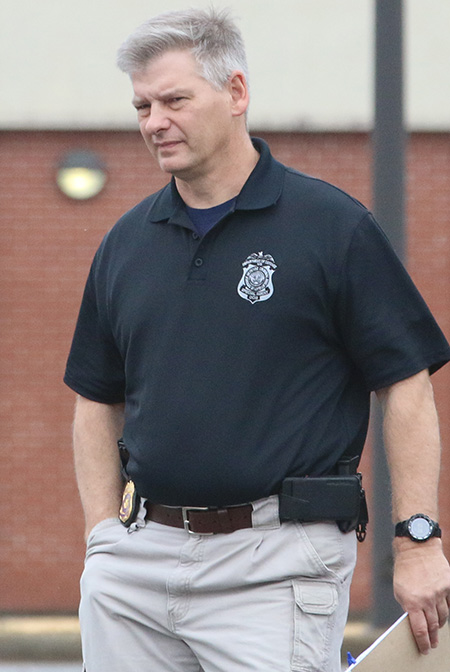 A spokesperson for the FBI confirmed that the FBI was assisting the U.S. Attorney’s Office and other agencies in a raid at the Jay Pharmacy in the Jay Medical Complex, next to the local hospital. Armed agents could be seen entering and exiting the building into the early afternoon Tuesday.
A spokesperson for the FBI confirmed that the FBI was assisting the U.S. Attorney’s Office and other agencies in a raid at the Jay Pharmacy in the Jay Medical Complex, next to the local hospital. Armed agents could be seen entering and exiting the building into the early afternoon Tuesday.
Agents from the Department of Defense Criminal Investigative Service, the FBI, and the Florida Department of Law Enforcement were among those on scene in Jay.
A similar raid was conducted at the office of two Jay doctors that share office space in the complex back in 2011. Neither doctor was directly accused of any crime and were both cleared of any possible wrongdoing. Dr. David Smith told NorthEscambia.com Tuesday morning that he was unaware of what was taking place at Jay Pharmacy. He said that he and his physician son have no ownership interest in the pharmacy.
A second federal and state raid occurred Tueesday morning at the Burklow Pharmacy on Woodbine Road in Pace. Federal and state authorities raided the business shortly after it opened Tuesday morning.
Investigators from the FBI as well as the Florida Department of Law Enforcement moved into Physician Specialty Pharmacy in Pensacola Tuesday morning. They could be seen hauling out boxes from the businesses and loading them into trucks and trailers.
Authorities have not released any further detail on any of the raids.
Pictured: Agents outside the Jay Pharmacy Tuesday. NorthEscambia.com photos, click to enlarge.
House Panel Approves Death Penalty Fix
February 3, 2016
A House panel on Tuesday approved proposed changes to the state’s death-penalty law in an effort to address a U.S. Supreme Court ruling that struck down Florida’s capital-sentencing structure as unconstitutional.
The House Criminal Justice Subcommittee’s 11-2 vote on the measure (PCB CRJS 16-07) came less than two hours after the Florida Supreme Court issued an indefinite stay of execution for Cary Michael Lambrix, who had been scheduled to die on Feb. 11. The court heard oral arguments in the case Tuesday morning.
Lawmakers in both chambers are hurriedly preparing legislation in response to the U.S. Supreme Court ruling, issued on the opening day of the 2016 session, in a case known as Hurst v. Florida. The Jan. 12 ruling overturned the state’s capital felony sentencing system, which gives judges — and not juries — the power to impose the death penalty.
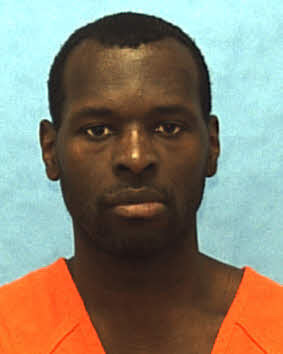 The high court’s decision came in the appeal of convicted murderer Timothy Lee Hurst, who was sentenced to death for the 1998 killing of fast-food worker Cynthia Harrison in Pensacola. Harrison, an assistant manager at a Popeye’s Fried Chicken restaurant on Nine Mile Road where Hurst worked, was bound, gagged and stabbed more than 60 times. Her body was found in a freezer.
The high court’s decision came in the appeal of convicted murderer Timothy Lee Hurst, who was sentenced to death for the 1998 killing of fast-food worker Cynthia Harrison in Pensacola. Harrison, an assistant manager at a Popeye’s Fried Chicken restaurant on Nine Mile Road where Hurst worked, was bound, gagged and stabbed more than 60 times. Her body was found in a freezer.
The 8-1 decision focused on what are known as “aggravating” circumstances that must be determined before defendants can be sentenced to death. A 2002 U.S. Supreme Court ruling, in a case known as Ring v. Arizona, requires that determination of such aggravating circumstances be made by juries, not judges.
Under Florida law, juries make recommendations regarding the death penalty, based on a review of aggravating and mitigating circumstances, but judges ultimately decide whether defendants should be put to death or sentenced to life in prison.
The House would allow death sentences to be imposed only if juries — after weighing aggravating and mitigating factors — unanimously decide that at least one aggravating factor exists. The proposal would also require at least nine jurors to vote for the death penalty. The legislation is based on the recommendations of state attorneys.
Of the 31 states with the death penalty, Florida is one of only three that do not require unanimous jury decisions about imposing death sentences. Florida law only requires a simple majority of the jury to recommend death. The only other two states that do not require unanimous decisions — Alabama and Delaware — require at least nine jurors to vote in favor of capital punishment.
Whether death-penalty jury verdicts should be unanimous has been a major source of debate during discussions about the Hurst ruling, which did not specifically address the issue. Nearly all experts — with the exception of prosecutors — recommend that the state adopt a unanimous jury requirement to avoid the risk that Florida’s sentencing system could be struck down again in the future.
“The question arises, do you look simply at the narrow issue that Hurst addressed or do you look at the whole body of cases that the United States Supreme Court has talked about?” 10th Judicial Circuit Public Defender Rex Dimmig told the panel Tuesday.
But prosecutor Brad King argued that the measure goes “well beyond the dictates” of the Supreme Court’s order. And King, the state attorney for the 5th Judicial Circuit, said it is impossible to predict how the court will rule in years to come.
“To think we can sit here today and presume to understand what the U.S. Supreme Court can do … in the future is honestly a pipe dream,” he said.
Requiring unanimous decisions on death-penalty sentences would allow a single juror “to hold hostage the entire process,” King argued, pointing out that some of Florida’s most-notorious crimes failed to result in unanimous jury recommendations for the death penalty.
But University of Miami Law Professor Scott Sundby, who trains Florida judges in the death penalty, said research shows that 92 percent of juries that voted 9-3 in favor of the death penalty returned the same result if required to reach a unanimous decision.
“In other words, in 92 percent of the cases, when they deliberated to unanimity, they still came out as death,” Sundby said.
Not requiring a unanimous decision would put Florida in danger of having its law struck down again, he predicted.
“I promise you this would invite a lot of constitutional litigation, and the odds of it being reversed by the (U.S.) Supreme Court are quite high,” Sundby told the committee.
The House panel rejected an attempt by Rep. Randolph Bracy, D-Orlando, to amend the bill to require unanimity on death sentences.
“There is great racial and gender and geographical discrimination in how the death penalty is applied,” Bracy, who is black, said. For example, “no white person has ever been sentenced to death for killing a black person” in Florida, Bracy said. In contrast, murders involving white women are 6.5 times more likely to result in the death penalty.
“One way to reduce the bias is require unanimous juries,” said Bracy, one of two Democrats on the subcommittee who opposed the bill.
But Chairman Carlos Trujillo, a former prosecutor, said Bracy’s concerns rested more with the application of the death penalty than with the sentencing phase.
And, he said, the proposal is far from a done deal.
“By no way, I think, is this a 100 percent finished product,” Trujillo, R-Miami, said. “I’m sure all of these recommendations will come to play at some point.”
Senate President Andy Gardiner told reporters Tuesday that “there a lot of members in our chamber that would prefer a unanimous decision.”
But the Senate may cede to the House’s 9-3 position to finalize a bill before the session ends next month.
“What’s important is that we get an agreement done, and we pass something this session to address what’s been brought forward by the U.S. Supreme Court. And I think we’re on track to do that,” Gardiner, R-Orlando, said.
Lawmakers Look To Curb Unemployment Fraud
February 3, 2016
A House panel on Monday unanimously approved a measure aimed at cracking down on unemployment fraud based on identity theft — a practice lawmakers say is spiraling out of control.
In fact, House Economic Development & Tourism Chairman Frank Artiles said he’d been the victim of such a crime himself.
“I actually had my ID stolen, and we had unemployment benefits that were sent to the state (to establish a claim) under my name,” the Miami Republican said. “This is rampant throughout the nation, as well as in the state of Florida.”
Artiles’ subcommittee approved the measure (HB 1017), filed by Rep. Mike La Rosa, R-St. Cloud, who said it would save millions of dollars for Florida taxpayers.
“Over the years, (the Florida Department of Economic Opportunity) has begun receiving reports that criminals were turning to unemployment insurance — in our state called reemployment assistance — as a new front for identity theft-based fraud,” La Rosa told the panel.
The bill says “identity theft is especially problematic in this state, which the Federal Trade Commission reports has the highest per capita rate of identity theft in the nation.”
A special unit within the Department of Economic Opportunity has detected and prevented more than 146,000 fraudulent claims totaling $603 million since its inception in 2014, according to the agency.
Department Executive Director Cissy Proctor said the attempted fraud is a threat to people who need unemployment benefits — and to those who pay for them.
“We’re seeing an incredible amount of identity-theft crime coming into the system, and we are focused, through our anti-fraud measures, to keep those criminals out and to keep the trust fund healthy, to make sure the money is there for those that are eligible for the benefits,” she told The News Service of Florida on Friday. “Also, it keeps (unemployment) taxes low for businesses across the state that pay the money that goes into the trust fund.”
La Rosa’s bill takes several steps to beef up enforcement and penalties for cyber-crimes centered on public-benefits fraud.
It would give the Department of Economic Opportunity access to the Florida Department of Highway Safety and Motor Vehicles’ database of driver’s licenses — including photos and signatures — to validate claims for reemployment assistance.
It would increase penalties for people who fraudulently apply for unemployment benefits. The penalties would go from one year to five years for a first offense and would be 10 years for a second offense and a lifetime ban for a third offense.
Also, the bill would amend the definition of “racketeering activity” to include unemployment-benefits fraud under the Racketeer Influenced and Corrupt (RICO) Organization Act.
Monday was the first time the department-backed bill has been heard in committee. La Rosa removed parts of the bill that sought to allow the department to hire sworn law-enforcement officers and recover overpayments by garnishing wages.
“The department will continue to seek criminal investigators in its budget and will continue to build cases statewide with local law enforcement,” La Rosa said.
Rep. Clay Ingram, R-Pensacola, thanked La Rosa for the changes, saying he’d had concerns about “sworn law enforcement officers working for a department where that had never been done before.”
A Senate version of the bill (SB 1216), filed by Sen. Kelli Stargel, R-Lakeland, has been sent to four committees.
by Margie Menzel, The News Service of Florida
Tate High Hosting Souper Bowl And Student Gallery Night
February 3, 2016
 The Tate High School Art Department is hosting a Student Gallery Night and Souper Bowl Thursday from 5-7 p.m. in the Art Building. Students will be selling their own art work as well as hand-crafted ceramic bowls and soup or chili. All proceeds from the sale of the bowls and food will benefit their ceramics classes, with 10 percent going to the Manna Food Bank.
The Tate High School Art Department is hosting a Student Gallery Night and Souper Bowl Thursday from 5-7 p.m. in the Art Building. Students will be selling their own art work as well as hand-crafted ceramic bowls and soup or chili. All proceeds from the sale of the bowls and food will benefit their ceramics classes, with 10 percent going to the Manna Food Bank.
The cost is $10 to purchase a handmade bowl plus food and drink, or $5 to purchase just food and drink. The public is invited to join in and support the arts at Tate High School.
Pictured above and below: Some of the bowls available during the Souper Bowl event at Tate High School. Pictured bottom: Some of the student art pieces that will be for sale. Submitted photos for NorthEscambia.com, click to enlarge.



